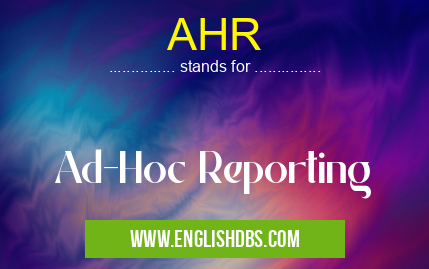What does AHR mean in PLANNING
Ad-hoc reporting is a type of reporting that takes place on an as-needed basis. It is not part of the regular workflow and is most commonly used when the need for a specific report arises out of nowhere. Ad-hoc reports are usually more detailed than regular reports, and can provide invaluable insight into various aspects of an organization’s operations. In government organizations, ad-hoc reporting can be used to gain insight into various governmental policies and decisions, in order to better understand their implications and effects. AHR stands for Ad-Hoc Reporting, which means using specialized data analysis techniques to answer questions or uncover patterns from extremely complex datasets that could not otherwise be gleaned using traditional methods. AHR enables government agencies to respond quickly to changing requirements and provide up-to-date information on topics such as public safety, economic trends, healthcare statistics, and administrative operations.

AHR meaning in Planning in Governmental
AHR mostly used in an acronym Planning in Category Governmental that means Ad-Hoc Reporting
Shorthand: AHR,
Full Form: Ad-Hoc Reporting
For more information of "Ad-Hoc Reporting", see the section below.
» Governmental » Planning
Essential Questions and Answers on Ad-Hoc Reporting in "GOVERNMENTAL»PLANNING"
What is ad-hoc reporting?
Ad-hoc reporting is a type of business intelligence tool that enables users to quickly and easily generate individual reports when needed. This type of reporting is different from more traditional automated reports, which are typically generated on a regular schedule and with pre-defined criteria.
What kind of data can I analyze using ad-hoc reporting?
Ad-hoc reporting enables you to analyze any kind of data stored in your database(s). This includes customer, sales, financial or any other data that can be pulled into the report.
How does ad-hoc reporting help me make better decisions?
Ad-hoc reporting helps you uncover trends, patterns and insights about your data that would otherwise remain hidden. By having access to these insights, you're able to make more informed decisions that are based on actual data rather than intuition alone.
What are the benefits of using ad-hoc reporting?
The primary benefit of ad-hoc reporting is its flexibility; it allows you to quickly generate customized reports as needed without having to invest time in creating a template or learning a complicated software interface. Additionally, it allows for deeper analysis than traditional reports since it provides full access to all available data points. Finally, it can help save resources since once an “ad hoc” report is created, it can be used multiple times in the future without requiring additional manual effort.
Who should use ad hoc reports?
Ad hoc report generators are often used by businesses and organizations who need accurate and up–to–date information in order to make timely decisions or anticipate changing trends in their industry. They are also beneficial for smaller businesses who may not have the resources or expertise required for more complex business intelligence solutions like OLAP Cubes.
Is there a limit to what I can do with my ad hoc report?
No – there isn't technically any limit as to what you can do with your report; however, depending on the complexity of the query and amount of data being queried, performance may become an issue if too many variables are included at once. It's important to keep this in mind when designing your queries. Additionally, some queries may require expert knowledge such as SQL in order for them to run properly.
Do I need special software or hardware for ad hoc reporting?
In most cases no – as long as you have a computer with access to an internet connection then ad hoc reports can generally be generated from within popular web browsers such as Chrome or Firefox.
How secure is my data when running an ad hoc report?
Generally speaking, very secure – enterprise level security protocols and access controls ensure only authorized personnel have access to sensitive information when running reports.
Can I export my results from an ad hoc report?
Yes – many platforms provide easy exporting options so that the inquiry results can be shared with colleagues or stakeholders in whatever format works best, such as PDFs or Microsoft Excel documents.
Final Words:
Ad-hoc reporting has become an important tool for government organizations seeking quick answers amid the ever changing environment surrounding them. AHR gives those organizations the ability to uncover hidden insights into the data so they can make evidence based decisions that are accurate and effective. With direct access to detailed data analysis results using cutting edge technology, AHR makes it easier for government organizations to stay aware of changes occurring in their environment and act accordingly.
AHR also stands for: |
|
| All stands for AHR |
